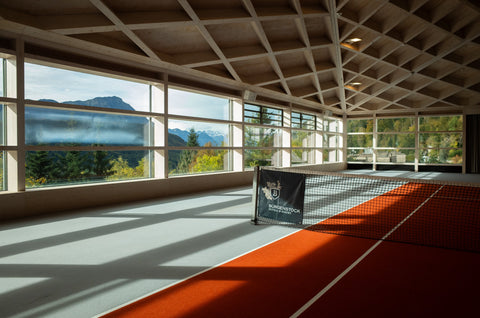When tennis plants its roots in new soil, the results can be extraordinary. This was true for the Brazzaville Challenger, a groundbreaking tournament in the Republic of Congo that brought professional tennis to a vibrant new stage this past November. This event perfectly captured Broken Rackets’ ethos—celebrating tennis as more than a sport, but as a culture, a lifestyle, and a catalyst for connection between people.
Though the Broken Rackets team couldn’t be there in person, this story is built on collaboration—with players, organizers, and the ATP—all of whom helped us piece together the narrative of a tournament that broke new ground, both literally and figuratively. It all started when ATP Challenger Director Eric Lamquet connected us with Brazzaville Challenger organizer Arzel Mevellec, whose vision and dedication were instrumental in bringing this event to life. Like the Congo River carving its path through Africa, the Brazzaville Challenger is shaping a new course for tennis.

A Vision Beyond the Baseline
The Brazzaville Challenger was born out of a visionary goal: to create an African tennis tour that would bring professional-level competitions closer to home for players across the continent. Following the successful launch of the Kigali Challenger earlier in the year, organizers approached the ATP with an ambitious idea—a second African tournament, this time in Brazzaville, with just three weeks to make it happen.
This wasn’t just about staging another tournament. It was a bold step toward leveling the playing field and breaking barriers that have long kept professional tennis out of reach for many in Africa. It was about laying the foundation for a future where young players could chase their dreams without the burden of crossing continents, bringing tennis to a place where its potential could flourish in untapped soil.


Challenges On and Off the Court
Pulling off a professional tournament in such a short timeframe was nothing short of a Herculean effort. The center court lines had to be rushed in from France and were installed the day before the first match. Equipment like stringing machines and nets had to be imported. Even ensuring that players could enter the country without issues was a logistical challenge.
Yet, the event came together through sheer determination and cooperation between French and Congolese teams. The local community played a vital role; organizers trained the Congolese team in tournament management, communications, and technical operations to build local expertise for future events. This investment on the front end will allow organizers and locals to carry tennis in Brazzaville forward, ensuring the Challenger’s legacy endures well beyond the final point.


Players Who Seized the Moment
The tournament attracted a diverse field of players, some seasoned, others looking for their first break on the ATP Challenger stage.
Gonçalo Oliveira, a Portuguese-born tennis player who currently represents Venezuela on the ATP Challenger Tour, provided a standout performance. Backed by an enthusiastic team of supporters, he powered through the competition to claim the title. For others, this tournament was a rare opportunity to step into the professional tennis world. Some made the journey at the last minute, driven by a desire to compete in a unique setting.
For many others, the Brazzaville Challenger was a gateway into professional tennis. Several competitors took a leap of faith, traveling to Congo with hours to spare to compete in this pioneering tournament. One particularly compelling story involved a player, Simone Agostini, whose luggage didn’t arrive with him. Forced to play his first singles match with just one racket and one outfit, he demonstrated resilience despite the setback. While his singles run ended early, he turned things around in the doubles draw, advancing to the final after finally being reunited with his gear.
Moments like these reflect the unique spirit of the Brazzaville Challenger—a mix of pure grit, unexpected challenges, and the thrill of making history on a new stage.


A Sustainable Future for African Tennis
The Brazzaville Challenger was a catalyst for building cultural bridges and creating a sustainable future for tennis in Africa. From the outset, organizers sought to minimize environmental impact without sacrificing quality. Local products were used whenever possible, from the food served to the materials sourced for the event. Stringers, an essential part of any tournament, were trained remotely through video conferencing with experts in France. This represented an innovative solution that reduced travel while building local expertise.
But sustainability goes beyond environmental concerns. Organizers wanted to create an ecosystem where African tennis could thrive in the future. By grouping tournaments geographically, the ATP aims to minimize player travel, reduce costs, and encourage more local participation. This approach benefits the environment but also opens the door for young African players to compete on a professional stage without the preparation and financial hurdles of traveling abroad.


Looking Ahead
The Brazzaville Challenger proved that tennis can thrive in unexpected places. It reminded us that the sport we love is about where it’s played, who gets to play it, and the stories that unfold along the way. In Brazzaville, tennis found fresh soil, reimagining its traditions while embracing the vibrancy of a new place.
This tournament was a statement: that ambition, collaboration, and an open mind can bring tennis to places where its roots have yet to fully grow. It lifted up the idea that tennis is for everyone, and its future is brighter when it’s shared across borders and cultures.
Broken Rackets is honored to spotlight stories like these, whether courtside or through the words of those who lived them. With the African tour expanding and the Brazzaville Challenger returning this month, we’re watching the beginnings of something extraordinary. This is just the start, and we can’t wait to see how tennis continues to rewrite its narrative in Africa.







